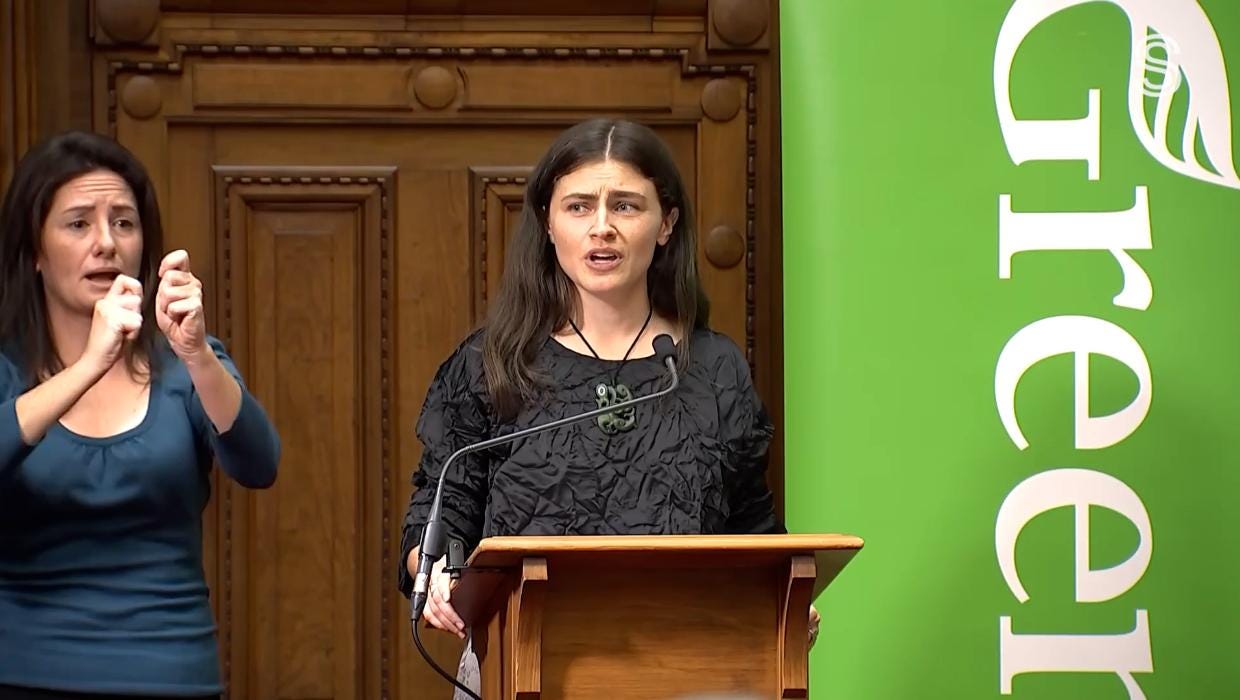As promised, here is my review of the expenditure portion of the Greens’ alternative budget. Claiming to have found $88 billion in additional revenue thanks to taxing the shizzzzz out of New Zealanders, the Greens have gone to town spending big. It will come as zero surprise that my scepticism over their revenue generation plans carries through to their big spending ideas. This is a critical review, my friends.
Also, I am writing this with a couple of pinots under my belt. The tone will likely differ to that of my first Green budget piece.
The Green Party’s proposed spending is ideologically consistent with their usual neo-Marxist/Champagne Socialist approach. It could well have been written by a group of stoned first year political science majors who will expect to walk into a six-figure role in the public service at the conclusion of their degree despite having never seen a payslip in their life. What they present as a progressive investment plan is more accurately described as a massive redistribution of wealth, backed by untested, legally fragile, and administratively nightmarish tax mechanisms.
Winston Peters has called Chloe Swarbrick and Marama Davidson “Marx and Engels” and it is true that their budget is more manifesto than fiscal plan. At the heart of the document is the assumption that profit should be avoided and the state should act to hamper it as much as possible. Other assumptions of note relate to their allergic reaction to anything that remotely suggests that adults should be responsible for their own wellbeing. Rather than a safety net for when people fall on exceptionally hard times, the Greens fervently believe it is the job of the state to keep every single one of us in comfort, even if we simply decide to stop providing for ourselves. The state they envisage is so big that a person would interact with it at least 46 times before breakfast (bread sourced by standing in line at the state supermarket for 3 hours the night before). Okay, I’ll give it a rest. Let’s look at the Greens’ spending.
Winston Peters has called Chloe Swarbrick and Marama Davidson “Marx and Engels” and it is true that their budget is more manifesto than fiscal plan. At the heart of the document is the assumption that profit should be avoided and the state should act to hamper it as much as possible. Other assumptions of note relate to their allergic reaction to anything that remotely suggests that adults should be responsible for their own wellbeing. Rather than a safety net for when people fall on exceptionally hard times, the Greens fervently believe it is the job of the state to keep every single one of us in comfort, even if we simply decide to stop providing for ourselves. The state they envisage is so big that a person would interact with it at least 46 times before breakfast (bread sourced by standing in line at the state supermarket for 3 hours the night before). Okay, I’ll give it a rest. Let’s look at the Greens’ spending.

The Details
A lot of what the Greens present as innovative and groundbreaking policy has in fact been thoroughly attempted elsewhere in the world to great failure. In classic modern Marxist fashion, they are determined to try things that have already failed multiple times over in other jurisdictions. Their expenditure featured the following:
- An “Income Guarantee”: everyone out of paid work or studying would receive “at least $395 a week” from the government. Single parents would receive an additional $140 a week.
- Disability income: those with a health condition or disability that prevents them from working would receive 80% of the full-time minimum wage from the Government
- Family Top-Up: families with an income of less than $61,000 per year would be entitled to a payment of $220 per week for their first child, and an additional $135 per week for every other child.
- Double Best Start: to $146 per week and extend it to every child under three “as a universal child benefit”.
- Free GP visits and return of free prescriptions
- Free dental care: annual check-ups and basic dental care (eg. fillings and sealants), mobile dental vans, community dental clinics, and specialist care for people “when they’re in significant pain” and require oral surgery.
- Free* early childhood: extension of 20 hours free care per week to children from six months until school age, cap fees at $10 per day for hours above the 20 hour entitlement, put in place governance and ownership structures that drive the sector to be not for profit.
- A new Ministry of Green Works: $8 billion; modelled off the old Ministry for Works, they claim it will create approx 25,000 jobs and a further 16,857 jobs from economic activity the Ministry generates. Seems to be an expansion of Jobs For Nature.
- Māori health initiatives: kaupapa Māori suicide prevention services, kaupapa Māori maternity care services, early bowel cancer screening for Māori and Pasifika people, and Māori-led primary care clinics
- Re-establishing Te Aka Whai Ora / Māori Health Authority
- Fully fund the Southern Hospital in Dunedin: public only model.
- (Return of) Ka Ora, Ka Ako (School lunches) programme: Increase the funding to an average of $6.80 per meal, expand to 400 more schools, providing lunch to 150,000 more children every day.
- Light rail in Auckland, Wellington and Christchurch
- (Return of) free public transport: for children 12 and under, and half price for 13 to 24 year olds.
- (Return of) the Clean Car Discount: provide rebates for zero emissions vehicles only, paid for by fees on the most polluting vehicles.
- 35,000 new public homes over 5 years
- Government funded solar power: Up to $6,000 to cover the cost of installing and solar on 30,000 Kainga Ora homes in the next three years
- Zero Carbon upgrade loans: Interest-free loans of up to $30,000 to cover the cost of zero carbon home upgrades
It is also a strategy that assumes infinite government competence. The Greens are highly critical of our existing systems and yet they want to expand them, give them vastly more power, and put them under further pressure. Delivery of complex social services like dental care, early childcare, and GP visits at no cost and with no delays is frankly impossible. It is arrogant and foolish to assume that they will avoid the failings of Government projects like KiwiBuild, Transmission Gully, Auckland Light Rail which were plagued by cost overruns and delivery delays.
“As Venezuelans have learned over the past 20 years of socialism, “free things” come at a high price.” - Daniel Di Martino (Venezuelan expatriate studying economics in Indianapolis)
demonstration against the socialist government of Venezuela
The Greens claim this enormous spend-up will still result in budget surpluses; a claim that is laughable given their reliance on wealth and inheritance taxes that are historically volatile and easily avoided by the wealthiest. An economy with low productivity growth, weak private investment, and declining workforce participation, which is exactly what their vision would create, is not going to result in surpluses. The assumptions used to prop up the Greens’ manifesto ignore economic reality and treat the budget like an Excel exercise with no feedback loop from the real world where people react to seismic shifts like they plan.
Most depressing of all, in my view is the way the Greens would set out to cause lifelong structural dependency on the state. Accusations of Marxism and socialism are often overblown, but in this case they are truly warranted. This plan contains no serious expectations of any personal responsibility nor any incentives to engage in commerce and grow the economy. Guaranteed incomes, regardless of effort, encourage longterm unemployment or permanent student life. There’s no point in saving, working hard, starting a business, or taking financial risks. In fact, those who do would be penalised severely by the Greens through taxation. This is a social model built not on empowerment, but entitlement, and that’s unsustainable.
The Greens claim this enormous spend-up will still result in budget surpluses; a claim that is laughable given their reliance on wealth and inheritance taxes that are historically volatile and easily avoided by the wealthiest. An economy with low productivity growth, weak private investment, and declining workforce participation, which is exactly what their vision would create, is not going to result in surpluses. The assumptions used to prop up the Greens’ manifesto ignore economic reality and treat the budget like an Excel exercise with no feedback loop from the real world where people react to seismic shifts like they plan.
Most depressing of all, in my view is the way the Greens would set out to cause lifelong structural dependency on the state. Accusations of Marxism and socialism are often overblown, but in this case they are truly warranted. This plan contains no serious expectations of any personal responsibility nor any incentives to engage in commerce and grow the economy. Guaranteed incomes, regardless of effort, encourage longterm unemployment or permanent student life. There’s no point in saving, working hard, starting a business, or taking financial risks. In fact, those who do would be penalised severely by the Greens through taxation. This is a social model built not on empowerment, but entitlement, and that’s unsustainable.

Gulag prisoners constructing the Baltic Sea canal
It is a case of ideology over evidence. For all Chloe Swarbrick repeats that the Greens are an “evidence-based” party, it is plainly a fantasy. Every major initiative in this budget, from the wealth tax to the universal income, has either been tried and abandoned elsewhere or never been successfully implemented in a comparable open economy. Yet the Greens think they can somehow defy global evidence and economic history. Their approach isn’t remotely led by evidence; it’s ideologically driven redistribution masked as reform.
This is not a credible alternative budget. It’s a radical ideological document with unrealistic assumptions about revenue, unfunded and doomed-to-fail expectations for public service delivery, and dangerous consequences for New Zealand’s competitiveness, investment climate, and social cohesion.
The changes they propose to the Emissions Trading Scheme (ETS) would effectively destroy it. These are not just tweaks that they are proposing. They represent a radical restructuring of New Zealand’s entire climate pricing mechanism.
The Greens’ would immediately add agriculture to the scheme. Pricing agricultural methane with no real transitional pathway is politically tone-deaf and reckless. Agriculture is a core export sector and imposing hard costs risks gutting rural economies. No comparable country prices biological methane in this way. New Zealand farmers would face unmatched competitive pressure. Let’s be honest, this is less about sustainability and more about penalising a sector the Greens ideologically oppose.
The Greens also want to weaken the ability of forestry to earn carbon credits, arguing it distorts land use. Weakening forestry’s role in the ETS without a clear alternative reduces New Zealand’s ability to meet net zero targets.
Much like a lot of the bright ideas in the manifesto, this total ETS overhaul would create a hostile investment environment. Unpredictable regulatory shifts would deter long-term capital investment in clean technology, infrastructure, and innovation. Our ETS was one of the first in the world, to now destroy it signals regulatory instability, weakening our credibility.
The Green approach to climate policy is characteristically aggressive to business, agriculture, and those who cannot afford to replace everything in their home and life with the latest technology. It is a punishment system, not a collaborative, progressive movement. Rather than helping emitters transition, they propose financially squeezing them into compliance through taxes, bans, and revoked subsidies. No credible plan exists for what replaces lost rural jobs, how food prices will be stabilised, or how equity is maintained in the face of skyrocketing costs for transport and heating. No plan exists for what we are to eat when farmers are driven out of work.
“Socialism run rampant—not cronyism, corruption, falling oil prices, or U.S. sanctions—caused the crisis in Venezuela.” - Manhattan Institute
Winston Peters and David Seymour are right. This budget is a blueprint for turning our country into the next Venezuela. It is easy to dismiss the insanity of the Greens as the fantasies of the irrelevant, but the assumption that will not get close to the levers of power is a naive one. Labour will not govern alone again in my lifetime unless MMP is overhauled. They need the Greens and probably Te Pāti Māori too. This means they will have to make policy concessions and agree to their coalition partners’ bottom lines.
Ani O'Brien comes from a digital marketing background, she has been heavily involved in women's rights advocacy and is a founding council member of the Free Speech Union. This article was originally published on Ani's Substack Site and is published here with kind permission.



7 comments:
Swarbrick is dangerous - she has appeal for the indolent and entitled who want a free ride and envy those with assets. The average NZ voter is now more dangerous than ever before - due to the Marxist indoctrination via Education since the 1980s.
Presumably in the brave new green world, uttering the word " Accountability" will earn us a prolonged period of political re-education.
Unless MMP (Fabian construct) is overhauled/scrapped, policy concessions will continue to be made among the different parties (foreign agents), agreed too and quickly enacted as it has been since MMP’s inception, all for our “collective” good of course.
And little by little this is how the collective west is been driven into Bolshevik communism, with the Uni-party plus extras, acting out differences, but behind closed doors all united in following the globalist corporate agenda to bring in their dystopian, technocratic, feudalistic NWO.
Question for Ani: how on earth did you navigate a tertiary system infected with left wing/liberal mumbo-jumbo, hocus pocus sprinkled a touch of voodoo?
And emerge uninfected from indoctrination with your commonsense in pristine condition? I fear too few others are like you.
Ardern and Robertson and Little, Jxn et al would happily gone along with this nonsense.
Beware that they ever have enough votes to start this all over again.
O'Brien is preaching to the converted, at least to the extent her opinion piece is read by the Breaking Views audience. She really has to convince the 330,883 fools who gave their party vote to the Greens at the last election to make a real difference The hard left, like the poor, have always been amongst us, but under the FPP system their influence was minimal. MMP is nothing but a Trojan Horse that allows bad actors into the halls of power, not through the strength of their ideas, but through the ignorance of the voting public. Even then they would be politically impotent without the aid and comfort offered by the union-funded Labour Party. So never forget, a vote for Labour is a vote for Green. But to be fair, at least the Greens tell you what they want to do. Labour doesn't even bother doing that any more.
Nails it! Marx in the 19th Century: " If we do not succeed now, we will succeed later." Wake up!
Post a Comment
Thank you for joining the discussion. Breaking Views welcomes respectful contributions that enrich the debate. Please ensure your comments are not defamatory, derogatory or disruptive. We appreciate your cooperation.